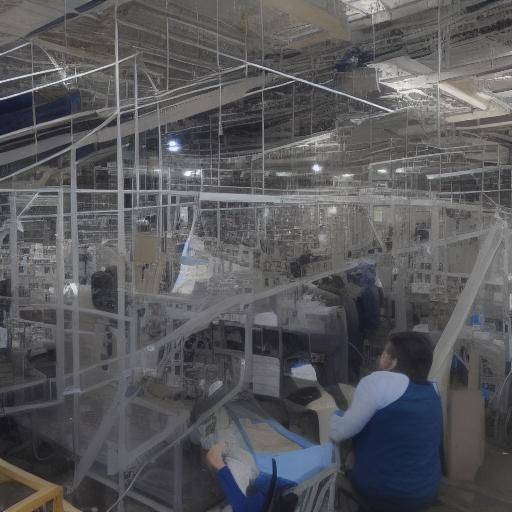
Noise in the working environment can have a significant impact on employee productivity and well-being. In this article, we will explore in detail how noise affects productivity and how to effectively manage it. From its history and evolution to future trends and predictions, we will offer a complete look at this crucial issue. In addition, we will provide practical advice, expert opinions, case studies and future predictions to provide a deep and enriching understanding. Join us on this journey to discover how noise can be managed to improve productivity in the working environment.
Introduction
Noise in the working environment is a factor that can have a major impact on employee productivity. From noisy conversations to team buzzing, noise can distract, stress and decrease concentration. In this context, it is crucial to understand how noise affects productivity and what strategies can be implemented to effectively manage it.
History and Background
To fully understand the impact of noise on productivity, it is important to explore its history and evolution. Over the years, noise has been a factor in working life, with a wide range of implications in individual and collective performance.
The noise in the working environment has evolved significantly throughout history, from the factories of the Industrial Revolution to modern office spaces. Historically, noise in the working environment has been seen as an inevitable by-product of production, but as the awareness of employee well-being has increased, so has the approach to noise management.
Several milestones have marked the development of noise management strategies in the working environment, from the implementation of government regulations to advances in soundproofing technology. These changes reflect a growing understanding of the effects of noise on workers' productivity and well-being.
Deep analysis
The impact of noise on productivity can be addressed from different perspectives. On the one hand, noise can hinder concentration and attention, resulting in a decrease in labour performance. On the other hand, excessive noise can generate stress and fatigue, which in turn can affect employee motivation and commitment. In addition, noise can interfere with effective communication between team members, which affects collaboration and efficiency at work.
Effective noise management in the working environment can provide a number of benefits, including increased concentration, stress reduction and improved communication among employees. A quiet and well-managed working environment can foster greater commitment, creativity and general well-being among workers.
Exhaustive examination
Noise management in the working environment can be addressed through various strategies and approaches. From the implementation of physical solutions, such as soundproofing panels, to the adoption of policies that promote respect for silence and concentration, there are multiple ways to manage noise in the workplace.
In addition, the implementation of flexible workspaces, the introduction of rest areas and the adoption of advanced sounding technologies are key considerations for effective noise management in the working environment. In assessing the available options and adapting them to the specific needs of the organization, significant improvements can be made in the productivity and well-being of employees.
In addition, it is crucial to consider the impact of noise in specific working environments, such as open offices, production environments and shared spaces. Each environment presents unique challenges in terms of noise management, so it is important to develop customized strategies that meet the specific needs of each context.
Comparative analysis
The relationship between noise, productivity and the working environment is complex and multifaceted. When analysing in detail each of these elements, it is possible to identify areas of convergence and discordance. Noise can affect productivity differently in different working environments, and effective noise management may require approaches adapted to the specific characteristics of each context.
Practical Tips and Accessible Tips
To address the impact of noise on productivity, it is crucial to implement concrete strategies that promote a peaceful and productive working environment. Some practical measures include the implementation of flexible working hours that minimize noise, the creation of designated areas for tasks that require concentration and the promotion of an organizational culture that values silence and concentration.
Industry ideas and Expert Reviews
Noise management in the working environment is an issue that has generated a broad debate in the working community and among experts in the field. By bringing together opinions from industry leaders and working environment management experts, we can get a clearer picture of best practices and innovative approaches in this area.
Case Studies and Real Life Applications
Real case studies provide valuable lessons on effective noise management in the working environment. By analysing concrete examples of organizations that have implemented successful strategies to manage noise, we can extract relevant insights and apply to other working environments.
Future Trends and Predictions
The future of noise management in the working environment is marked by emerging trends, technological innovations and changes in organizational culture. By exploring these trends and predictions, we can prepare ourselves for the challenges and opportunities that will arise in the handling of noise in the working environment.
Conclusion
In short, the impact of noise on employee productivity and well-being is a topic of great relevance in the current working environment. In understanding the effects of noise, as well as effective strategies for managing it, organizations can significantly improve the working environment and performance of their employees. Noise management requires holistic approaches, tailored to the specific needs of each working environment, and represents an opportunity to foster a more productive and healthy working environment.
Frequently asked questions
1. What is the impact of noise on productivity in the working environment?
Noise in the working environment can negatively affect the concentration, communication and well-being of employees, which in turn can reduce productivity and performance.
2. What measures can be implemented to manage noise in the working environment?
Effective measures to manage noise in the working environment include the implementation of physical sound solutions, the creation of designated areas for tasks that require concentration and the promotion of an organizational culture that values silence and concentration.
3. What are the benefits of managing noise effectively in the workplace?
Effective noise management in the workplace can result in increased concentration, stress reduction and improved communication among employees, which contributes to increased work performance and overall well-being.
4. What role do sound technologies play in noise management in the working environment?
Soundproofing technologies play a crucial role in noise management in the working environment, providing effective solutions to minimize noise interference in labor activities.
5. What are the emerging trends in noise management in the working environment?
Emerging trends in noise management in the working environment include the development of innovative technological solutions, the customization of sounding strategies and the integration of noise management practices in the design of workspaces.
6. How can organizations prepare to address the impact of noise on productivity?
Organizations can prepare to address the impact of noise on productivity through the implementation of periodic evaluations of the working environment, the adoption of policies that promote a peaceful working environment and the training of employees in noise management practices.
By helping to understand the influence of noise on labor performance and providing effective strategies to manage it, we hope that this article will become a valuable tool for improving the working environment and productivity in various organizations.






















































